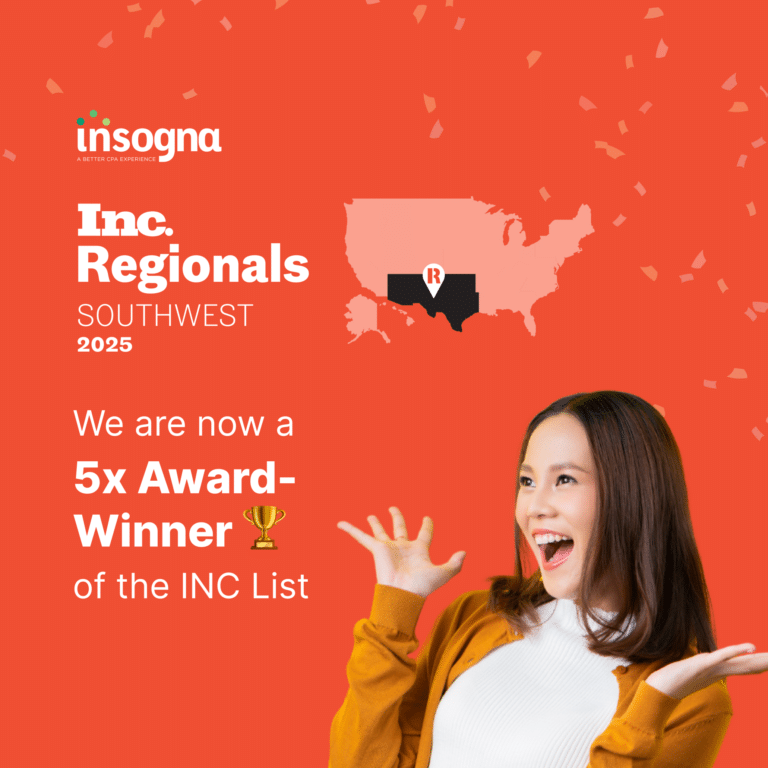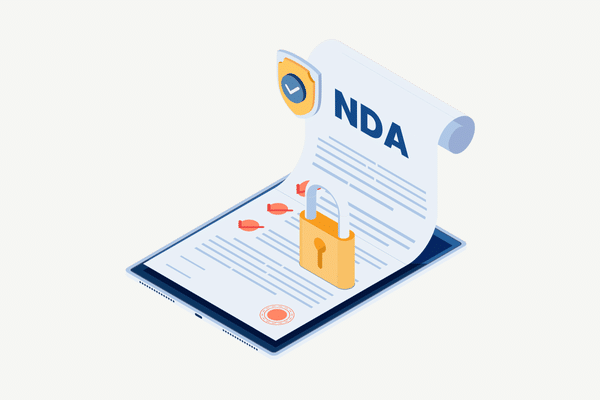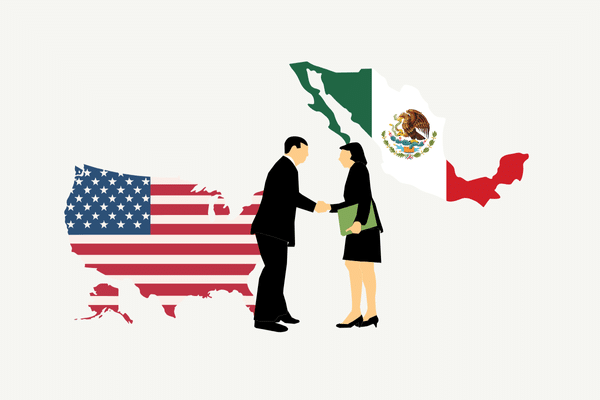
Summary
🎉 5-Time Inc. Regionals Honoree! Insogna CPA has been recognized on the 2025 Inc. Regionals list—our fifth time earning this prestigious honor!
🚀 Proven Business Growth Impact – Our proactive tax strategies and financial advisory services have helped clients save thousands, increase profitability, and scale with confidence.
🔥 What Sets Us Apart? – We go beyond tax prep with clear communication, real-time insights, and a team-based approach to support your business growth year-round.
At Insogna CPA, we’ve always believed that success isn’t just about numbers—it’s about proactive strategy, clear communication, and unwavering support for our clients. And now, for the fifth time, we are proud to announce that we’ve been named to the 2025 Inc. Regionals list! 🎉
Being recognized on this prestigious list means that we are among the fastest-growing, privately held companies in the region, achieving remarkable growth over the last two years. It’s an incredible honor, and it wouldn’t have been possible without our dedicated clients, our forward-thinking team, and our commitment to transforming the CPA experience.
But here’s what this award really means: our growth is a direct reflection of the success of the businesses we serve. When our clients thrive, we thrive. And that’s why we’re so passionate about what we do.
What It Means to Be on the Inc. Regionals List (Again!)
The Inc. Regionals list recognizes companies that have achieved outstanding growth between 2021 and 2023. This year, only 951 companies across the nation made the cut, contributing a combined 13,809 jobs to the U.S. economy and reaching a median growth rate of 106%.
Being featured for the fifth time is a testament to our commitment to helping business owners grow with confidence, plan proactively, and navigate their financial future with clarity.
Let’s take a look at how we got here.
How We’ve Helped Businesses Like Yours Grow
At Insogna CPA, we don’t just “do taxes” or “manage books.” We partner with business owners to create a strategic financial plan that reduces tax liabilities, improves cash flow, and ensures sustainable growth. Here are some real-world examples of how we’ve made an impact:
Success Story #1: Helping a Local eCommerce Business Save Over $80,000 in Taxes
One of our clients, a fast-growing Austin-based eCommerce business, was struggling with rising tax liabilities and unclear financial reporting. They felt overwhelmed and unsure about how to scale profitably.
🚀 Our Solution:
- Implemented proactive tax planning strategies to reduce their tax burden.
- Introduced real-time financial tracking, giving them clarity on their numbers.
- Provided advisory support on optimizing inventory and pricing models.
💡 The Result:
- Over $80,000 saved in taxes in the first year alone!
- Increased profitability by 14%, allowing them to reinvest in growth.
- Confidence in financial decision-making—no more last-minute tax surprises.
“Before Insogna CPA, we felt like we were constantly playing catch-up. Now, we actually feel in control of our finances!” – Google Review ⭐⭐⭐⭐⭐
Success Story #2: Transforming a Service Business With Smart Financial Strategies
A boutique marketing agency in Texas came to us feeling frustrated. Their past CPA was reactive, slow to communicate, and failed to provide strategic insights. They wanted more than just tax filing—they needed a financial partner.
🎯 Our Solution:
- Transitioned them to monthly financial advisory sessions for better planning.
- Helped them navigate employee hiring incentives and tax credits.
- Set up automated payroll and bookkeeping, saving hours of manual work.
💡 The Result:
- Increased revenue by 22% thanks to better cash flow management.
- Saved over 50 hours per year in administrative work.
- Built a tax-efficient compensation plan for their growing team.
“Insogna CPA isn’t just an accounting firm—they’re a true partner in our business growth!” – Google Review ⭐⭐⭐⭐⭐
What Sets Insogna CPA Apart?
We know that business owners are tired of generic CPA firms that focus on compliance instead of growth. That’s why we’ve built our firm differently.
💡 Here’s what makes us the go-to CPA firm for business owners in Texas and beyond:
✅ Proactive Tax Strategy – We don’t just file your taxes; we actively look for ways to reduce your tax bill year-round.
✅ Clear, Straightforward Communication – No confusing jargon or vague advice—we make financial strategy easy to understand.
✅ Tech-Enabled, Human-Centered Approach – We use cutting-edge financial tools but keep our focus on personalized, relationship-driven service.
✅ Team-Based Support – Instead of relying on one overworked CPA, you get an entire team of specialists ensuring accuracy, timeliness, and expert insights.
Our mission is simple: help business owners gain financial clarity, maximize profits, and grow with confidence.
A Huge Thank You to Our Clients!
This 5-time Inc. Regionals recognition is about more than just us—it’s about the incredible business owners we serve. Your ambition, resilience, and innovation inspire us every day.
If you’re looking for a CPA firm that actually cares about your success and guides you like a true business thought partner, we’d love to chat.
🚀 Let’s take your business to the next level. Schedule a strategy session today: 📅 Book a Free Consultation
Here’s to continued success—together! 🎉





